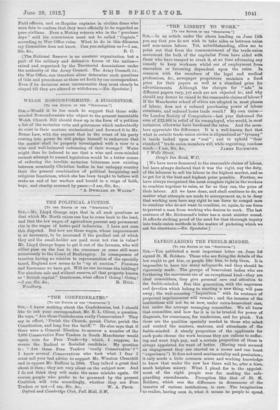" THE LIBERTY TO WORK. "
[To THE EDITOR OF THE "SritoTATos..1
SIR,—In an article under the above heading on June 15th you say that you do not wish to take sides as between union and non-union labour. Yet, notwithstanding, allow me to point out that from the commencement of the trade-union movement the bulk of the capitalist Press have sided with those who have essayed to crush it, at no time advancing any remedy to keep workmen whilst out of employment from starvation or becoming dependent upon the rates. In common with the members of the legal and medical professions, &c., newspaper proprietors maintain a fixed price for their papers as well as a standard price for • advertisements. Although the charges for "ads." in different papers vary, yet such are not objected to; and why should any demur be raised to the reasonable claims of labour If the Manchester school of ethics are adopted in most phases of labour, does not a reduced purchasing power of labour eventuate, and reduced home trade result P My own union— the London Society of Compositors—last year disbursed the sum of 222,464 in relief of its unemployed, who would, in most instances, otherwise have burdened the rates. And the mem- bers appreciate the difference, It is a well-known fact that what in outside trade-union circles is stigmatized as" tyranny" is inside looked upon as " zeal" ; and to uphold "their standard" trade-union members will, while regretting, condone much.—I am, Sir, &c., JAMES RICHMOND.
7 Wells Street, Gray's Inn Road, W.C.
[We have never demurred to the reasonable claims of labour, but have always declared that it was the right, nay the duty, of the labourer to sell his labour in the highest market, and so to get for it the best and highest price possible. Further, we have always recognized the most complete right in the workers. to combine together to raise, as far as they can, the price of their labour. All we have done, and shall continue to do, no matter what attempts are made to misrepresent us, is to deny that working men have any right to use force to compel men to combine who do not want to combine, or, again, to use force to prevent a man from working who desires to work. The last sentence of Mr. Richmond's letter has a most sinister sound. It affords striking proof of the need for that thorough inquiry into trade-union methods in the matter of picketing which we ask for elsewhere.—En. Spectator.]






















































 Previous page
Previous page